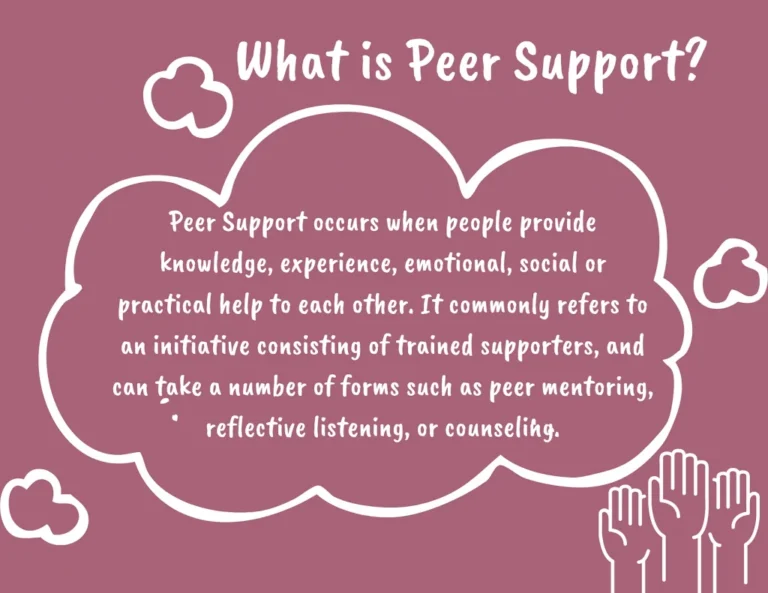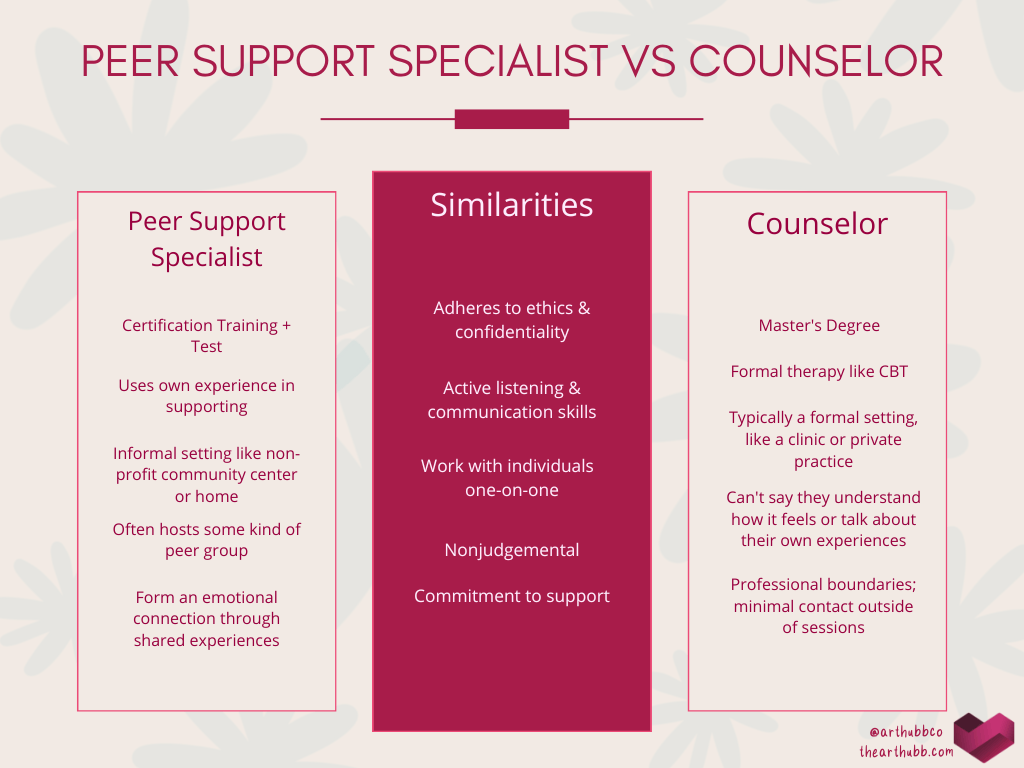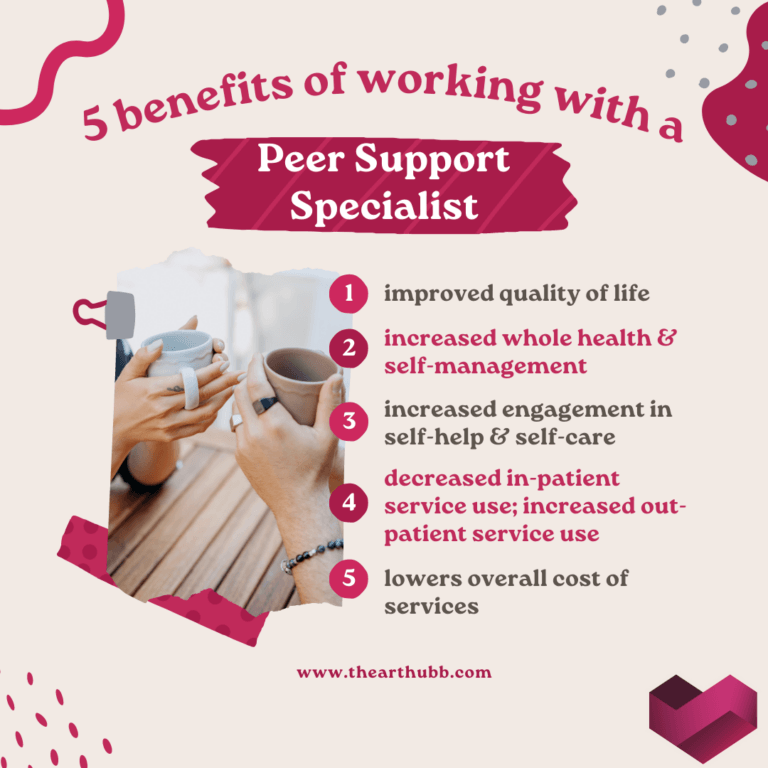Peer Support Specialist: Why did I choose to become one?
Peer Support Specialist? Who is that? What do they do? How does someone become a Peer Support Specialist? Why would someone become a Peer Support Specialist? In this article, we will explore the who they are and what they do, how they’re different from a typical mental health counselor, and why I chose to become one.
If you are looking for a judgement-free, cozy, peer support style community, Breakfast and Feelings Check-In on Twitch might be for you. Every weekday morning, we hold space over on twitch.tv/jennyfurhh for checking in with how we’re feeling and share what’s on our hearts and minds. The live stream is a great way to anonymously share how things are going for you and receive support from others in the community. We even have Muenster’s Mood Meter of Feeling Words available on-screen to better discern how you’re feeling.

Who is a Peer Support Specialist?
A Peer Support Specialist (PSS) is an individual who has lived experience and uses their recovery story to help support and instill hope in those in similar situations. Some examples of lived experiences that Peer Support Specialists have are:
- mental illness
- substance abuse recovery
- ADHD
- medical conditions
- disabilities
- chronic illness
- Veteran
Peer Support Specialists are gaining recognition as an alternative person to traditional mental health providers and are quickly becoming a leading model of care. Peer-run support groups and one-on-one meetings represent an economical alternative to expensive mental health resources and provide individuals with a sense of community, belonging and acceptance. Peer support is not a replacement for therapy or or treatment. However, it can work alongside with a unique layer of support.
Peer Support Specialists provide assistance in setting, reaching, and maintaining personal recovery goals. In addition, a PSS can serve as an advocate, help access community resources, and models recovery and wellness. Working with a Peer Support Specialist looks different for everyone. For example, one may find it helpful to talk through their weekly goals and identify what they need to be successful. Someone else might prefer to use their time with a PSS to develop their Action Plan for Prevention and Recovery.
Peer Support Specialist vs Counselor
Peer Support Specialists have a defined Scope of Practice that is a little bit different than those of a medical provider or therapist. Although peer support has been around for centuries, it is only recently that PSS have been employed by various medical and mental health organizations.
While there are several similarities between Peer Support Specialists and Counselors, there are also unique differences that make Peer Support a helpful complement to clinical therapy or counseling. One isn’t required to be in therapy to see a Peer Support Specialist, though. Both Peer Support Specialists and Counselors adhere to Ethics and Confidentiality when providing services. Additionally, both providers are trained in active listening and have great communication skills.

A unique difference between Peer Support Specialists (PSS) and Counselors is that a PSS utilizes their lived experience and recovery when supporting individuals. Counselors are trained to say “I hear you” but can’t say “I understand how that feels; I’ve been there.” Comparatively, the role of a PSS is to help individuals feel less alone in what they’re going through. In addition, PSS tend to form more emotional connections through shared experiences whereas a Counselor is a more professional role that doesn’t tend to offer support outside of official sessions.
How to Become a Certified Peer Support Specialist
As Peer Support Specialists continue to gain recognition as a valuable component of mental health services, the career opportunities also continue to expand (Moll et al., 2009). The requirements for certification in the US vary by state and you can see what your state requires by checking Doors to Wellbeing’s database.
To become certified, a Peer Support Specialist has to take a training course, along with a certification test. Depending on your area and position, supervision hours may be required. This training offers Peer Supporters the opportunity to learn how to actively listen in a non-judgemental way, as well as how to share their recovery story in strategic and helpful ways. Finally, PSS training addresses ethics, confidentiallity, and professionalism.
Benefits of Working with a Peer Support Specialist
Peer Support is an evidence-based practice for people with mental illness, addiction, Veterans, and more. There are a lot of benefits that can come with working with a Peer Support Specialist. Mental Health America compiled a document that identifies key outcomes of peer support services over a range of studies differentiated by program, geographic location, and year. These benefits are:
- improved quality of life
- increased whole health and self-management
- increased engagement in self-help and self-care
- decreased in-patient service use & increased out-patient service use
- lowers overall cost of services

Why would I talk to a Peer Support Specialist when I have supportive friends and family?
Family and friends can be great shoulders to cry on and lean on for support. There is no question about that. However, because those individuals in our lives care so much about us, they likely hold a bias or desire to share advice based on what they have gone through. This can cause a strain on boundaries within the family. A family member might think their suggestion is the most optimal one to help. In reality, it can put a lot of pressure on the individual to make the “right” choice.
Working with a Peer Support Specialist invites an outside view into what is going on, and supports the individual based on where they are and what works best for them. A PSS is meant to be a guide who walks alongside an individual in their recovery. We are also bound by confidentiality, which means individuals can feel confident in their decisions for themselves rather than worrying about what their family or friends will say.
Why I like being a Peer Support Specialist
When I discovered that peer supports exist, it finally occurred to me why I never quite felt like I was understood when sharing how I was feeling in different circumstances. Therapists and medical professionals are often trained not to say “I understand” since they likely don’t have that lived experience aspect. They don’t understand what that feels like.
After learning that peer support is specifically about sharing my own lived experiences with others, to help others feel less alone, to instill hope, and to inspire recovery, I realized this is the space I had been missing. So many other spaces I sought support in were focused more on “looking on the bright side” or how we can better change our behavior to fit in. It was less about meeting people where they are.
Peer Support Specialists are trained to meet people where they are. We’ve been there and we want to support you in your journey.
I enjoy working with individuals, offering kindness and empathy and support. I’ve seen them go from feeling like they don’t have a friend in the world and they can’t go on, to becoming bolder and braver as they take steps to improve their circumstances.



2 responses to “Peer Support Specialist: Why did I become one?”
Thank you. I am just completing my Peer Support Worker Certification. I love what you have written. Are you focused on any particular peer-supported area? I do have a specific area, but I am not quite sure if one specific topic is where it’s at. I’m just curious about what is going to become of this wonderful opportunity.
Congratulations on completing it!! When it comes to focus area, I suppose I tend to be quicker to offer help to those who are also ADHD… however, I think it really just depends on the person and what they’re going through. Sometimes, I don’t relate to anything of what’s being discussed and the peer typically says that they just want to be heard and don’t mind that I haven’t been through it myself.
Are you working by yourself or with an agency?